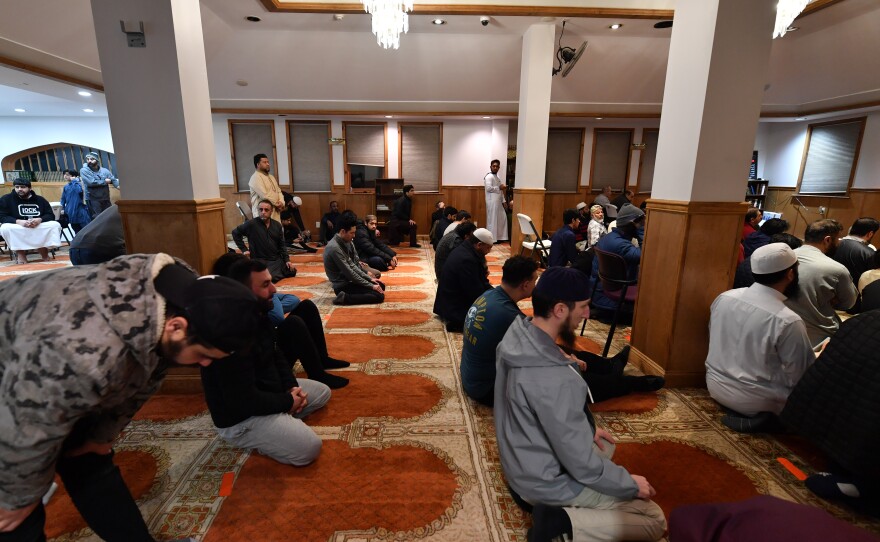The northwest wall of windows on the top floor of Brennan Hall at the University of Scranton look out over the city.
It’s just after 6:30 p.m. and the sun begins to set. Members of the university's Muslim Student Association (MSA) are celebrating Ramadan. They bring in trays of food from a downtown Thai restaurant that’s halal — food that’s permitted according to Islamic Law.
Plates of dates are in the middle of each table. A prayer cloth lays on the floor facing the Kaaba, Islam's most important mosque and the holiest site in Mecca, Saudi Arabia. They break their daily fast — called Iftar — at 7:21 p.m. with the sweet fruit. The prophet Muhammad, the founder of Islam, traditionally ate dates at sundown.
“The core essence is to remember those who are less fortunate than us," said Zainab Shah, vice president of the MSA.
The holy month of fasting, prayer and charity for Muslims is almost complete. This is the first year the MSA is celebrating Ramadan as a group.
"It is a month where we fast from sunup to sundown, so roughly for the United States that's around like 12 to 13 hours," said Shah. "It also varies every year."
Ramadan begins with the sighting of the new crescent moon.
The celestial body was just a sliver above Masjid Al-Noor on Scott Street in Wilkes-Barre during the first night of Ramadan on March 11. Inside the mosque, Muslims gathered after Iftar to pray. Women prayed together in one room and men in another. Mosques hold prayers five times a day.
This past Sunday in Brennan Hall, Shah gave a presentation on Ramadan for those at Iftar. The MSA is open to anyone.
"We usually greet each other with 'Ramadan Mubarak' or 'Ramadan Kareem," she said. "Which means 'have a blessed Ramadan.' So if you have fellow Muslim friends, you can always just say that to them to have their back."
Aryan Chandavarker performed a call to prayer after the dates and before the dinner.
Shah is an international student from Pakistan and a University of Scranton legacy. Her father received his MBA from the university.
Freshman year she felt alone and sad during Ramadan. There weren't many accommodations for Muslim students. She searched for her community. Shah had her morning meal — called suhoor — before the sun came up alone in her small dorm room.
"My second year, I walked in with a new attitude," she said. "This cannot be happening for me and for anyone else.”
A professor suggested that she and Hiba Muhammad, a junior from Mountain Top, start a MSA. The organization is at many college campuses across the country. They founded the university’s chapter last year at the tail end of Ramadan. There’s now around 40 members in the club.
"Our main goal … is to create a community on campus and be able to create one unified place," said Muhammad. "Muslim students can find each other and also just educate the rest of the campus community about our religion and our holidays."

Shah says they always get the age-old question during Ramadan: can you drink water?
“No, not even water … you fast so that you understand someone who doesn't get three meals a day, three square meals a day," she said.
Hiba said fasting helps you think less about yourself.
"It kind of diverts your focus to be on your religion and on the people of the world who need help and how you can like be of service to them," she said.
Fasting is just one part of Ramadan. There are exceptions, including pregnant women, medical issues and those on active military duty.
"Prayer is a big part of it," said Shah. "You pray for people, for the underprivileged, for the poor, who don't have what you have.”
Muslims also increase acts of charity. Muhammad is donating to a different charity everyday.
The student leaders say they feel the impact of the war in the Middle East.
"You're fasting in solidarity ... you're fasting because we're a community so and they say that your prayers are answered more in the month of Ramadan. So that's why people are also praying more, they're praying for Gaza, they're praying for the people in Palestine,” said Shah.
Eid is the reward at the end of Ramadan. The holiday is predicted to end on April 9.
"That's the time where you get together with family wear new clothes, have presents go out, eat all you can throughout the entire day," said Shah.
Shah and Muhammad love talking about their faith and clearing up any misconceptions.
“Islam is a very forgiving religion," said Shah.

















